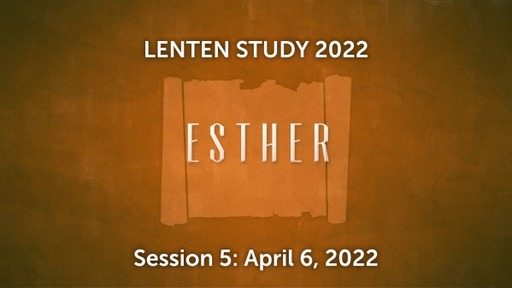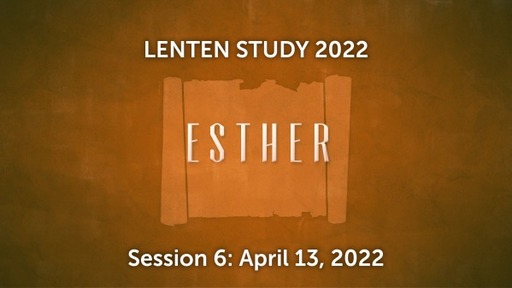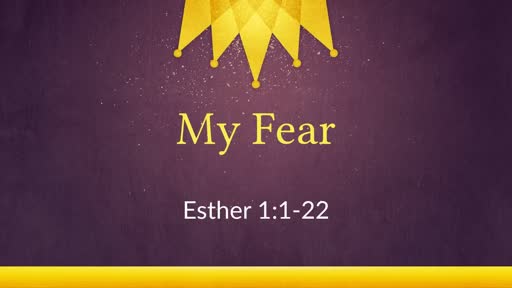Fearless | Session 3 | Esther
Sermon • Submitted
0 ratings
· 34 viewsNotes
Transcript
Intro Option 1: Review
Sometimes following God means fearlessly taking an unpopular stand.
God is never blind to our fearlessness.
God oftentimes rewards our boldness with greater influence.
Teaching Point 1: Being fearless isn’t always, if ever, easy.
· A little bit about Esther before we begin:
o Esther was a Jewish girl living in Persia under the reign of a king named Ahasuerus.
o She was part of the Jewish community that had been taken when the Babylonians attacked Judah.
o Esther’s parents had died
her uncle Mordecai was raising her.
o Esther was a beautiful woman,
and she eventually was chosen to become queen of Persia.
o Mordecai’s enemies hatched a plot to kill all of the Jews in Persia by tricking the king into writing a command that would allow for the murder of all of the Jews.
DO Y’ALL SEE HOW THE WORLD OFTEN TIMES PLAYS INTO THE HARDSHIPS OF GOD’S PEOPLE?
o The king did not know Esther was a Jew
thus didn’t realize the implications of the order he had signed.
o Esther’s uncle, Mordecai, came to Esther
encouraged her to use her influence with the king to spare the lives of the Jews.
o Esther was deeply concerned
that by doing so she may be risking her own life. We pick up her story here.
· Then, instruct students to turn to Esther 4 in their Bibles. Then read Esther 4:12-17 aloud.
And they told Mordecai what Esther had said. Then Mordecai told them to reply to Esther, “Do not think to yourself that in the king’s palace you will escape any more than all the other Jews. For if you keep silent at this time, relief and deliverance will rise for the Jews from another place, but you and your father’s house will perish. And who knows whether you have not come to the kingdom for such a time as this?” Then Esther told them to reply to Mordecai, “Go, gather all the Jews to be found in Susa, and hold a fast on my behalf, and do not eat or drink for three days, night or day. I and my young women will also fast as you do. Then I will go to the king, though it is against the law, and if I perish, I perish.” Mordecai then went away and did everything as Esther had ordered him.
o Esther’s uncle, Mordecai, was giving her a massive heads up.
- He was essentially saying that just because you are in the palace, and your identity as a Jew isn’t known at this point, don’t think you will get away unharmed.
This order will affect you too. Don’t think that you are safe, just because you are the Queen of Persia. A King’s word is strong and means everything.
- But then he says something even more profound, a phrase you may have heard before.
- In verse 14 Mordecai suggests that God may have led Esther to this very moment to be the deliverer of her people.
Esther, maybe God put you here to save the Jews.
- Looking at verse 16, we see that Esther understands this cost. Sure, I might be killed for this, but I need to think of God’s people.
- Esther reveals her dedication to her faith, to her God, and to her people.
· Remind students that, while the stakes most likely weren’t as high, many of them have probably found themselves in similar positions. Say something like:
o Many of us in this room have been in a situation where we knew God was calling us to do something, a task that He put on our heart.
- I am sure many we’re not signing a death wish, but we can admit things have happened to us that was tough.
- In that moment, we always have a choice, don’t we?
- Esther did. She could have done the easy thing. She could have been fearful. But she didn’t. She did the difficult thing.
- She embraced a fearless approach to her faith. And what we’re going to find out is that while being fearless isn’t always easy, it’s always right.
Optional Illustration: The Red Bull 400
· Explain to students that 400 meters is just barely a quarter of a mile. Explain that most people wouldn’t find 400 meters to a very tough run. After all, marathons are 26.2 miles. A quarter of a mile is pretty easy.
· Then, show one of the Red Bull 400 videos to your group. When you’ve finished, say something like:
o Now that’s a different kind of 400 meter run, isn’t it?
- It’s funny how much pain a person can go through in such a short distance!
- Here’s the interesting thing about these races, and really any extreme athletic endeavor: People who sign up for them know how hard it’s going to be.
- They know their quads and calves will be burning. They know they will cramp. They know they may not even finish. But they do it anyway. Why?
· Explain to students that any of these types of extreme races are super challenging. And that’s kind of the point. People know that doing them will be tough. And so they throw themselves into it with all they have. Living a fearless faith is the same way. Explain that we know it’s hard.
Teaching Point 2: Being fearless often requires great faith in God’s power to take care of you.
· Before continuing on, fill the students in on some of the historical/cultural context behind the fear Esther expressed in Esther 4:16. Say something like:
o One of the things that made this such a difficult task is one of the customs surrounding the king.
- You see, a person couldn’t go to the king without being asked by the king to do so.
- Furthermore, Esther says in an earlier passage that she may have even fallen out of favor with the king; she had not been called in to see him for some time.
- So, by agreeing to intercede on behalf of the Jews, Esther was taking a life-threatening chance. Let’s see how it worked out.
· Direct students’ attention to Esther 5:1-3.
On the third day Esther put on her royal robes and stood in the inner court of the king’s palace, in front of the king’s quarters, while the king was sitting on his royal throne inside the throne room opposite the entrance to the palace. And when the king saw Queen Esther standing in the court, she won favor in his sight, and he held out to Esther the golden scepter that was in his hand. Then Esther approached and touched the tip of the scepter. And the king said to her, “What is it, Queen Esther? What is your request? It shall be given you, even to the half of my kingdom.”
o Look back at those first few words of verse 2.
- It’s easy to pass over it without catching it. But this is the absolute most essential moment in the story. Esther stood where the king could see her.
- In that moment, Esther could have been sentenced to death.
- All the king had to do was look away and that would seal her faith.
- By extending his scepter, he was giving Esther permission to approach him.
That’s one of those moments when you inhale and are so nervous to exhale until it’s over.
· Then, make sure students understand the level of trust Esther put in God in that moment. We know that Esther prayed and fasted, ostensibly asking God to protect her in her moment of trial. Say something like:
o Sometimes when God calls us to do something we know will be difficult, we can observe the situation and see how it might go wrong.
- Does anyone ever over analyse?
do y’all ever think of all of the possibilities that could happen?
We can see what is at stake.
- We can know that if God isn’t in charge, it can go really poorly for us.
with God, we can ££ deep breathe, and go ££
- And God IS faithful. He will never let us down.
Optional Illustration: Faith Quote
· Tell students to listen as you read the following quote, “I’m going to read this quote, and I want y’all to think about it.”
o “Faith lets other people do their thing without getting anxious and worried. It leaves its case in God’s hands.” (Jim Cymbala and Dean Merrill, from Fresh Faith (2003))
I’m going to be vulnerable for a moment, I get anxious.
I over think
I think through processes and possibilities before anything happens
I lose sleep sometimes.
I get anxious
· Explain that this quote highlights an important truth when it comes to living a fearless faith and trusting in God’s plan. Say something like:
o We can’t get caught up in worrying about how other people will react to our taking a fearless faith stance.
- We want to act with a lot of grace, but that cannot hinder what God is calling us to.
- We have to first make sure we are being faithful and obedient to Him.
- We can’t worry about how other people will react to our spiritual boldness.
CAN I GET AN AMEN? THAT HOLDS WAIT. IF WE COULD ALL JUST LET GO OF HOW PEOPLE REACT, WE COULD ACCOMPLISH SO MUCH.
- Whether they react positively or negatively, we have to trust that God is in control and will see us through the situations He allows us to encounter.
Teaching Point 3: If we fearlessly pursue the task God calls us to, God will lead us in accomplishing the task.
· Esther was ultimately successful and did indeed save the lives of all the Jews in Persia, no small accomplishment.
· Explain to students a simple truth: God never calls us to a task that He doesn’t equip us to accomplish.
o In other words, God never calls us to failure. To be sure, we can fail at a task God calls us to because of our own sin or disobedience. But, God will never call us to step out on faith and then cause us to fail.
but God doesn’t fail. What God sets out to accomplish is accomplished.
Turn to Ephesians 2. Explain that this is a letter the Apostle Paul wrote to the church in Ephesus close to 30 years or so after Jesus’ resurrection. Then, read Ephesians 2:8-10, then say:
For by grace you have been saved through faith. And this is not your own doing; it is the gift of God, not a result of works, so that no one may boast. For we are his workmanship, created in Christ Jesus for good works, which God prepared beforehand, that we should walk in them.
- Don’t miss that Paul says that we are saved through faith in Christ and not our works.
THAT IS SO CRUCIAL. SO MANY PEOPLE THINK YOU ARE SAVED FOR BEING A GOOD PERSON.
THAT IS NOT WHAT WE ARE SAYING
- But look what he says about those works:
- He says that part of why God saves us is to do good works in this world on His behalf.
- This is the tasks that God calls us to.
- Paul says that God literally has set the table for us to be successful at these tasks.
- Again, this is a principle that is evident all throughout Scripture.
- We see it in the lives of Abraham, Moses, David, Paul, and so on.
- It is a principle that we can live out in our own lives as well.
THESE PEOPLE HAD REASONS TO FEAR, BUT EVEN MORE REASONS TO PERSERVERE.
Optional Illustration: Personal Story
· Tell a personal story of a time when God called you to a task and equipped you to successfully accomplish the task.
WHEN I LIVED IN CANADA, I SERVED AN AREA THAT WAS TOTALLY VOID OF BEING RAISED KNOWING WHO JESUS WAS.
DAY 2, WE LITERALLY WERE SERVING AT A CELEBRATION OF LIFE FOR A FAMILY WHO LOST THEIR DAUGHTER TO DRUG OVERDOSE.
MY FIRST TIME LIVING IN A NEW CULTURE, WITH PEOPLE I DID NOT KNOW.
THE CANADIANS THAT WE WERE SERVING WITH WERE USED TO CHURCHES LEAVING THEM IN THE MIDST OF HARDSHIPS, SO THEY WERE NOT THE BIGGEST FANS OF CHURCHES.
ALL SUMMER, WE WERE THERE TO LOVE THEM, AND IT WAS NOT EASY.
I remember feeling burdened and tired, 24/7. We would try to connect with the neighborhood kids, we would try to make friends with the parents, and it was hard being in a situation when there was no trust.
It wasn’t until month three, when we had VBS week, and we were with kids from 7am until 8pm. For an entire week, we learned to just be present, learned how the churches had abandoned the town, and how Jesus stuck around for about a year or two before skipping town.
KNOWING THIS, PRAYING DAILY, AND SHOWING UP WAS HOW WE BEGAN TO REBUILD THE GOSPEL FOR THESE PEOPLE.
Now, the church staff that we were with have been there for 13 years,
they have locals serving as other pastors and leaders for the church.
The church has almost doubled since 2017.
God allowed for tasks to be accomplished and equipped us to do so because we showed up, no matter what the day brought.
NOWADAYS, I just show up. I say, God, I’m here
Use me
Mold me
Prepare me for what you need me for.
Every. Single. Day. Somedays I feel that I am not equipped to handle a situation, and I am then reassured that my timeline of tasks being completed is not God’s.
In His timing, God will enact His will, it is for us to be obediant and listen to what He asks of us.
Let’s pray.
CLOSING
Close with a prayer asking God to give your students boldness in the face of the tasks He calls them to take on.
ADVERTISEMENT
Related Media
See moreRelated Sermons
See more

Grace Community Fellowship • 21 views • 1:14:26


Grace Community Fellowship • 14 views • 1:32:05


Laughlin Community Church • 239 views • 30:15



